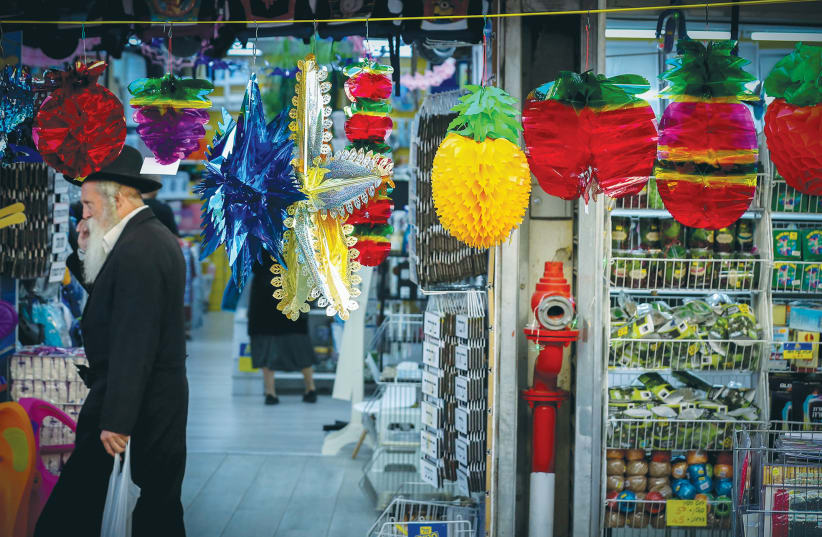Israel is the Jewish state. Consequently, Jewish holidays are easier to celebrate in Israel than anywhere else in the world. When it comes to holidays, what is taken for granted by Israelis is, for many Diaspora Jews, a serious undertaking.
The Gregorian calendar, the calendar used most everywhere else in the world, certainly the Western world, does not correspond with the Jewish calendar. It does not accommodate for Jewish holidays. In many places around the globe, neither do the seasons nor the weather.
The Jewish holidays were designed for Israel.
Rosh Hashanah and Yom Kippur are acknowledged as the High Holy Days by most of the Diaspora – and that is a blessing of its own sort for Jews living outside of Israel. Because of the elevated status of these days, most businesses understand when employees express the need, or the desire, to take those days off. In fact, many companies offer them as part of the list of company holidays one can choose to take off. And many schools and universities do not offer classes on Rosh Hashanah (or at least, on day one of Rosh Hashanah) and on Yom Kippur.
Sukkot is another story.
In Israel, Sukkot is celebrated by all. Even if you don’t build a sukkah almost every person celebrates because almost everyone is off from work on the holiday, also known as the Holiday of the Tabernacle – a fancy name for a sukkah. The weather is balmy and eating under the stars is a nice distraction from everyday life.
In the Diaspora, the celebration is not quite the same.
Taking time off for Sukkot (and Passover and Shavuot) usually comes under the heading of vacation time. And most years, the season has already changed. In the United States that would make it a chilly fall.
But if you live in northern Europe, you are probably wearing heavy jackets and craving hot soup. Sleeping outside in the sukkah, as many children like to do and many adults feel obligated to do, is an act of bravery. One friend, originally from northern Europe and now a Jerusalemite, reminisced about celebrating Sukkot in Denmark.
He described their special sukkah table, which was designed and built around a heater. And he told me about the sukkah roof when the meals finished and the pole that was used to lift the “schach,” so that the heavy snow did not cause the roof to come tumbling in. The roof had a “doohickey” just like the “doohickey” on a car that keeps the car hood from falling on you.
When they finished using the sukkah, they propped up the roof so the snow would slide off. When they came back into the sukkah, the roof was lowered.
That was a temporary fix. In homes around the world there are permanent sukkah rooms. Rooms designed with a retractable roof that, for eight days a year functions as a sukkah. Rooms with indoor heating – or air conditioning on those years when Sukkot falls out early – that make for a more comfortable sukkah experience.
All that is far from the Israeli Sukkot experience.
In Israel, Sukkot permeates popular culture. Decorations, many of them sold as Christmas decorations in the Diaspora, abound.
Outside of Israel, many Jews do not know when Sukkot is and others have not been in a sukkah since Sunday school. And, as times change and priorities have changed and fewer and fewer Sunday schools are open and functioning, more and more Jews will never celebrate Sukkot and will never enter a sukkah.
For most Diaspora Jewry, Jewish holidays are a chore. They are an intrusion into their daily lives. The numbers of Jews attending synagogue or temple is dropping. The holidays, and even Shabbat, are important only for the “Jewish Jews.” They have value only for those Jews who – consciously and deliberately – want Judaism and Jewish values to permeate their lives.
Outside of Israel, Jewish family life in the non-Orthodox world is on the wane.
Today, there are no requirements, no minimum standard of Jewish participation. The number of non-Orthodox Jews for whom Judaism is important and welcome the holidays, the celebrations, the continuity is growing smaller and smaller with each passing holiday, each passing year.
In Israel you cannot avoid the Jewish calendar. Part of the brilliance of the secular founders of Zionism and the Jewish state was making the Jewish calendar the country’s calendar. Their foresight solidified the importance of Jewish holidays and Jewish time for every Israeli Jew. They linked the Jewish heart and Jewish soul to Jewish time. This was and still is essential for the secular masses. Israel’s founders understood this. They intuited it.
It is reflected in the modern Hebrew language. Shabbat, Friday afternoon and Saturday is the weekend. The word for Saturday in Hebrew is “Shabbat.” Not Yom Hashevi’i, the Seventh Day. Use of the term Shabbat imbues a Jewish value, a consciousness, an awareness of shabbat – even for the most secular. In Yiddish, too, there is only one word for Saturday – Shabbos. Even the Yiddish socialists used the term.
Unfortunately, just like the Jewish holidays that are only optional for so many Jews, so too is affinity to, appreciation for and love of Israel.
Loving Israel is, for Diaspora Jews, simply another Jewish activity like the holidays and Shabbat that has fallen into category of optional. If there is any chance of rekindling the spark of love of Israel in young Jews it must come hand in hand with sparking an interest in the rest of Judaism that has been kicked to the side.
The natural link between the Land of Israel and Judaism is no longer transplantable to the Diaspora. Not so very long ago, Zionism was a form of Jewish affiliation. With Zionism one could sustain their Jewish life. Zionists built sukkot to celebrate a secular Zionist holiday called Sukkot.
Those days are gone.
